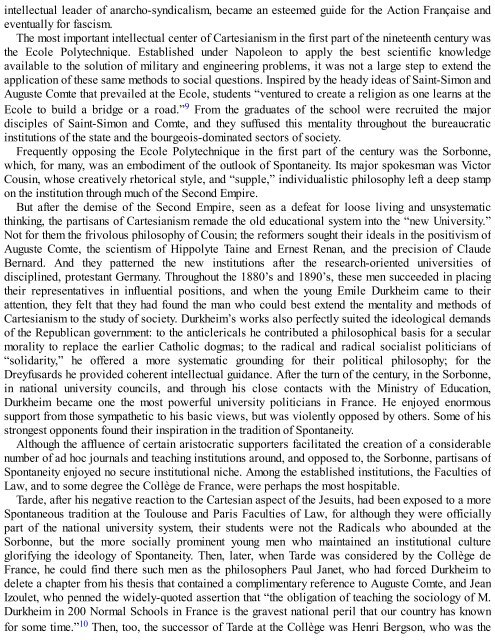3658925934
You also want an ePaper? Increase the reach of your titles
YUMPU automatically turns print PDFs into web optimized ePapers that Google loves.
intellectual leader of anarcho-syndicalism, became an esteemed guide for the Action Française and<br />
eventually for fascism.<br />
The most important intellectual center of Cartesianism in the first part of the nineteenth century was<br />
the Ecole Polytechnique. Established under Napoleon to apply the best scientific knowledge<br />
available to the solution of military and engineering problems, it was not a large step to extend the<br />
application of these same methods to social questions. Inspired by the heady ideas of Saint-Simon and<br />
Auguste Comte that prevailed at the Ecole, students “ventured to create a religion as one learns at the<br />
Ecole to build a bridge or a road.” 9 From the graduates of the school were recruited the major<br />
disciples of Saint-Simon and Comte, and they suffused this mentality throughout the bureaucratic<br />
institutions of the state and the bourgeois-dominated sectors of society.<br />
Frequently opposing the Ecole Polytechnique in the first part of the century was the Sorbonne,<br />
which, for many, was an embodiment of the outlook of Spontaneity. Its major spokesman was Victor<br />
Cousin, whose creatively rhetorical style, and “supple,” individualistic philosophy left a deep stamp<br />
on the institution through much of the Second Empire.<br />
But after the demise of the Second Empire, seen as a defeat for loose living and unsystematic<br />
thinking, the partisans of Cartesianism remade the old educational system into the “new University.”<br />
Not for them the frivolous philosophy of Cousin; the reformers sought their ideals in the positivism of<br />
Auguste Comte, the scientism of Hippolyte Taine and Ernest Renan, and the precision of Claude<br />
Bernard. And they patterned the new institutions after the research-oriented universities of<br />
disciplined, protestant Germany. Throughout the 1880’s and 1890’s, these men succeeded in placing<br />
their representatives in influential positions, and when the young Emile Durkheim came to their<br />
attention, they felt that they had found the man who could best extend the mentality and methods of<br />
Cartesianism to the study of society. Durkheim’s works also perfectly suited the ideological demands<br />
of the Republican government: to the anticlericals he contributed a philosophical basis for a secular<br />
morality to replace the earlier Catholic dogmas; to the radical and radical socialist politicians of<br />
“solidarity,” he offered a more systematic grounding for their political philosophy; for the<br />
Dreyfusards he provided coherent intellectual guidance. After the turn of the century, in the Sorbonne,<br />
in national university councils, and through his close contacts with the Ministry of Education,<br />
Durkheim became one the most powerful university politicians in France. He enjoyed enormous<br />
support from those sympathetic to his basic views, but was violently opposed by others. Some of his<br />
strongest opponents found their inspiration in the tradition of Spontaneity.<br />
Although the affluence of certain aristocratic supporters facilitated the creation of a considerable<br />
number of ad hoc journals and teaching institutions around, and opposed to, the Sorbonne, partisans of<br />
Spontaneity enjoyed no secure institutional niche. Among the established institutions, the Faculties of<br />
Law, and to some degree the Collège de France, were perhaps the most hospitable.<br />
Tarde, after his negative reaction to the Cartesian aspect of the Jesuits, had been exposed to a more<br />
Spontaneous tradition at the Toulouse and Paris Faculties of Law, for although they were officially<br />
part of the national university system, their students were not the Radicals who abounded at the<br />
Sorbonne, but the more socially prominent young men who maintained an institutional culture<br />
glorifying the ideology of Spontaneity. Then, later, when Tarde was considered by the Collège de<br />
France, he could find there such men as the philosophers Paul Janet, who had forced Durkheim to<br />
delete a chapter from his thesis that contained a complimentary reference to Auguste Comte, and Jean<br />
Izoulet, who penned the widely-quoted assertion that “the obligation of teaching the sociology of M.<br />
Durkheim in 200 Normal Schools in France is the gravest national peril that our country has known<br />
for some time.” 10 Then, too, the successor of Tarde at the Collège was Henri Bergson, who was the









![Genki - An Integrated Course in Elementary Japanese II [Second Edition] (2011), WITH PDF BOOKMARKS!](https://img.yumpu.com/58322134/1/180x260/genki-an-integrated-course-in-elementary-japanese-ii-second-edition-2011-with-pdf-bookmarks.jpg?quality=85)
![Genki - An Integrated Course in Elementary Japanese I [Second Edition] (2011), WITH PDF BOOKMARKS!](https://img.yumpu.com/58322120/1/182x260/genki-an-integrated-course-in-elementary-japanese-i-second-edition-2011-with-pdf-bookmarks.jpg?quality=85)





